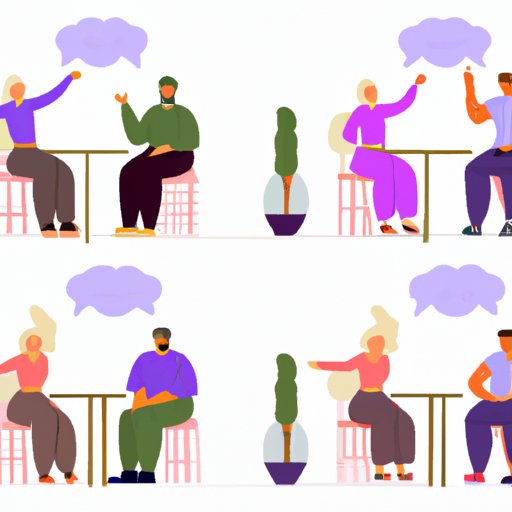Introduction
Do you find it difficult to keep a conversation going? Perhaps you struggle to come up with topics to talk about, or you feel nervous and fumble for words. Whatever the reason, the ability to have good conversations is a key social skill that can benefit you in many areas of life. Whether it’s making friends, networking at work, or building closer relationships with family and loved ones, the ability to engage others in interesting and enjoyable conversation is a valuable asset. In this article, we’ll explore some techniques and tips for keeping conversations going, including how to start with open-ended questions, listen actively, share stories and experiences, show interest in the other person, stay positive, be aware of body language, and practice active listening.
Start with open-ended questions
One effective way to kick off a conversation and keep it going is to start with open-ended questions. Unlike closed-ended questions that can be answered with a simple yes or no, open-ended questions require more thought and allow the other person to elaborate on their answer. This can lead to more interesting and in-depth conversations. Examples of open-ended questions include:
- “What do you enjoy doing in your free time?”
- “Tell me about a memorable experience you had recently.”
- “What are your thoughts on [current news topic]?”
Listen actively
Another crucial component of good conversation skills is active listening. This means paying close attention to what the other person is saying, responding thoughtfully, and using nonverbal cues to show you’re engaged. Here are some tips for active listening:
- Focus on the person speaking and avoid distractions.
- Respond thoughtfully by paraphrasing or asking questions.
- Use nonverbal cues like nodding and maintaining eye contact.
Share stories and experiences
Sharing personal stories and experiences can help to build rapport and create a more relaxed and comfortable atmosphere in a conversation. However, it’s important to do so in a way that is relevant and engaging to the other person. Here are some tips for sharing stories and finding common ground:
- Look for opportunities to relate your experiences to the other person’s interests or experiences.
- Avoid oversharing or dominating the conversation – instead, share just enough to create a connection.
- Be mindful of your tone and body language to convey your emotions and engage the other person.
Show interest in the other person
Showing genuine interest in the other person can help to create a positive and engaging conversation. This involves asking questions, finding common interests, and actively listening to their responses. Here are some tips for expressing interest in the other person:
- Ask open-ended questions that show you want to learn more about them.
- Look for common interests or experiences to help build rapport.
- Express empathy and understanding when appropriate to show you care about their feelings and experiences.
Stay positive
Keeping the conversation light and positive can help to create a more pleasant and enjoyable atmosphere. While it’s important to be honest and authentic, you should also avoid getting bogged down in negative topics or dwelling on problems. Here are some tips for staying positive in a conversation:
- Avoid complaining or being overly critical.
- Look for opportunities to inject humor or positive observations.
- Be mindful of your tone and body language to convey positivity and energy.
Be aware of body language
Body language can play a big role in how a conversation is perceived. Being aware of your own body language and that of the other person can help you to create a more positive and engaging interaction. Here are some tips for being aware of body language:
- Maintain good eye contact to convey interest and attention.
- Use open and welcoming body language, such as uncrossed arms and relaxed posture.
- Pay attention to the other person’s body language to gauge their level of engagement and receptivity.
Practice active listening
Finally, practicing active listening is an ongoing process that requires consistent effort and dedication. Here are some additional tips for improving your active listening skills:
- Avoid interrupting or finishing the other person’s sentences.
- Ask clarifying questions to ensure you understand their perspective.
- Summarize what they’ve said to show you’re paying attention.
- Show empathy and understanding to create a more supportive and caring conversation.
Conclusion
Good conversation skills are important for building strong relationships and social connections. By starting with open-ended questions, actively listening, sharing stories and experiences, showing interest in the other person, staying positive, being aware of body language, and practicing active listening, you can keep conversations going and create a more enjoyable and fulfilling social life. Remember to stay engaged and invested in the other person, and be willing to adapt your approach based on their needs and interests. With practice and persistence, you can improve your conversation skills and reap the many benefits of meaningful social connections.
